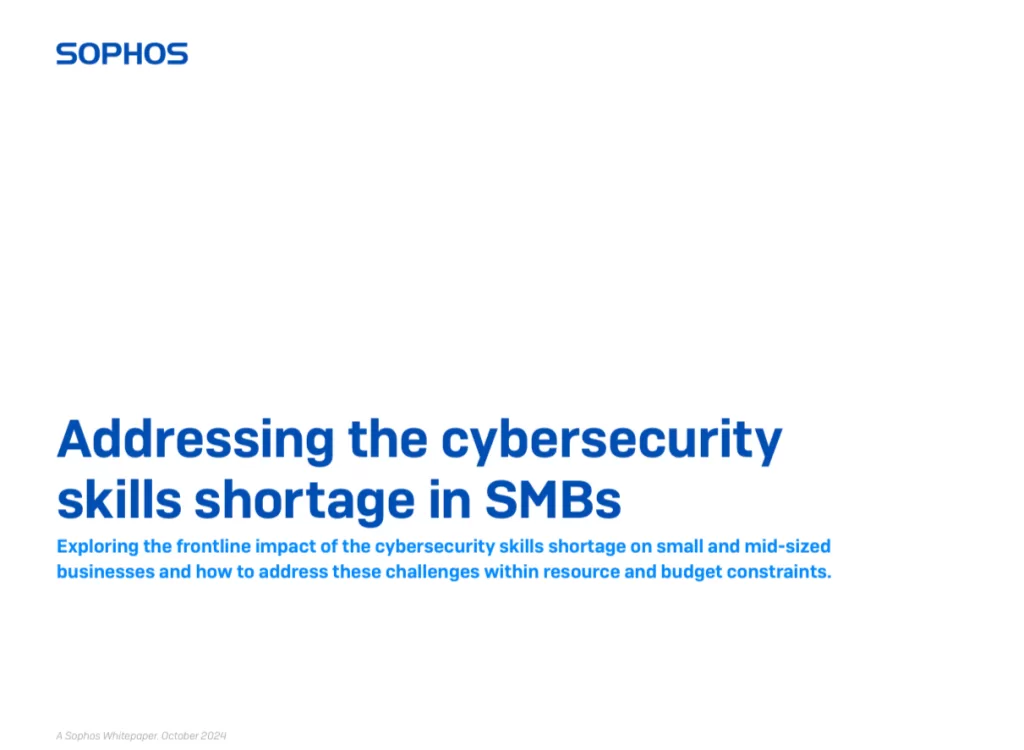Small and mid-sized businesses (SMBs) are grappling with a critical shortage of cybersecurity skills, leaving them vulnerable to increasingly sophisticated cyberattacks, according to a recent report from Sophos. The report, published in October 2024, highlights the disproportionate impact of the global cybersecurity talent shortage on organizations with fewer than 500 employees. These businesses, it warns, are at heightened risk of data breaches and ransomware attacks as they struggle to find and retain skilled cybersecurity professionals.
Sophos commissioned a survey of 5,000 frontline IT and cybersecurity professionals from 14 countries, with 1,402 respondents working in SMBs. The findings reveal a troubling trend: SMBs rank the lack of in-house cybersecurity expertise as their second-biggest risk, behind only zero-day threats. In contrast, larger companies, which are better equipped to handle cybersecurity challenges, place the skills shortage much lower on their list of concerns.
Our takeaways follow, you can access the whole report here.

Cyber Insurance Tied to MDR Services
As SMBs look for ways to mitigate these risks, many are turning to managed detection and response (MDR) services, which provide 24/7 monitoring and threat response. The report emphasizes that MDR services not only bolster an organization’s cybersecurity posture but can also lead to savings on cyber insurance premiums.
Insurance providers often view companies that use MDR services as lower-risk, offering them discounts on premiums. For example, a North Carolina-based non-profit with 350 employees reduced its cyber insurance premium by $8,000 after implementing Sophos MDR services, bringing the total cost of the service down to just $467 annually. This financial incentive is driving more SMBs to consider outsourcing their cybersecurity needs.
Skills Shortage Hits SMBs Harder
The cybersecurity skills gap is particularly pronounced for smaller organizations. With limited staff and resources, SMBs often find it difficult to attract top talent in cybersecurity, which has become a high-demand field globally. The report shows that nearly all SMBs (96%) find at least one aspect of investigating security alerts challenging. This struggle contrasts with larger companies that have dedicated teams and the resources to stay ahead of threats.
Tasks such as identifying and prioritizing security signals, keeping accurate records, and remediating threats in a timely manner are significant hurdles for SMBs. As the report notes, 76% of SMB respondents find it challenging to identify which signals to investigate, and 74% struggle to prioritize those signals.
This lack of expertise is compounded by capacity issues. Most SMBs cannot afford round-the-clock cybersecurity coverage, leaving them vulnerable during off-hours. The report found that 33% of the time, SMBs have no one monitoring their systems for suspicious activity, exposing them to attacks during nights, weekends, and holidays. Cybercriminals exploit these gaps, with 91% of ransomware attacks occurring outside standard business hours.
Ransomware: A Growing Threat
The shortage of cybersecurity professionals is making SMBs particularly vulnerable to ransomware attacks. According to the report, 74% of ransomware incidents in SMBs result in data encryption, compared to 66% in larger organizations. This discrepancy suggests that smaller businesses struggle to detect and neutralize ransomware before it can cause damage.
Sophos points to the complexity of modern cyber threats, which demand high levels of expertise to address. As attackers use increasingly sophisticated tactics, SMBs are finding it difficult to keep up, leading to higher rates of successful attacks.
Burnout Adds to the Strain
On top of these operational challenges, SMBs are also dealing with the human cost of the skills shortage. The report cites research showing that 85% of organizations report burnout among their cybersecurity and IT staff, with nearly a quarter experiencing frequent fatigue. Over the past year, 90% of companies have seen a rise in burnout, with 30% describing the increase as significant.
This burnout exacerbates the existing talent shortage, as overworked employees struggle to keep up with the demands of an always-on cybersecurity environment. With fewer staff members to share the workload, the risk of mistakes increases, further weakening a company’s defenses.
Third-Party Solutions Offer Relief
For most SMBs, hiring additional cybersecurity professionals is simply not an option. Instead, the report suggests that these businesses can alleviate the pressure by partnering with third-party security providers. Managed service providers (MSPs) and MDR services offer an effective way to add both expertise and capacity without the need to expand in-house teams.
MSPs, which have long provided IT support to smaller businesses, are increasingly offering cybersecurity services to meet the growing threat landscape. The report notes that 81% of MSPs now offer MDR services, allowing SMBs to benefit from both IT support and advanced threat detection through a single provider.
In addition to outsourcing security, SMBs are encouraged to use cybersecurity solutions designed specifically for businesses of their size. While many products are built for larger enterprises, SMBs often struggle to deploy and manage these tools effectively. Instead, the report recommends looking for solutions that are easy to use, with automated responses to threats and intuitive controls that minimize the need for manual intervention.
Sophos Solutions for SMBs
Sophos, a cybersecurity provider, offers a range of products and services tailored to the needs of smaller organizations. The company’s MDR service for SMBs provides 24/7 threat detection and response. The report highlights its effectiveness in reducing the risks faced by smaller businesses.
Sophos also emphasizes the importance of integrating cybersecurity solutions within a unified platform. By consolidating tools such as endpoint protection, firewalls, and email security into a single interface, SMBs can reduce the complexity of managing their defenses. This integration enables better coordination across different security layers, allowing businesses to respond more effectively to emerging threats.
The cybersecurity skills shortage is not expected to improve in the near future, leaving SMBs at continued risk. However, the report surmises that smaller businesses can mitigate the impact of the skills gap by partnering with third-party security specialists and adopting solutions designed for their unique challenges.
Other News: Sophos Security Teams with Cowbell (Opens in a new browser tab)
Other News:
